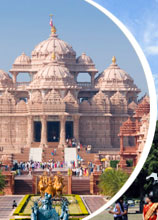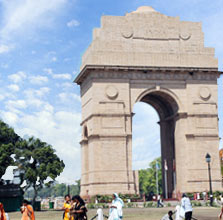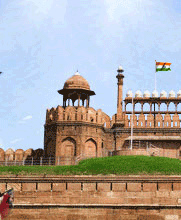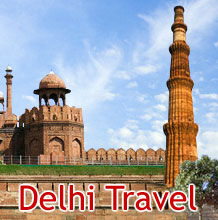 There
is nothing as a unique culture of Delhi. This is so because Delhi is the
capital city of India, where people from all over the country have come
and settled. Therefore, the culture of Delhi represents the culture of
all the states of India in parts. In other words, it is a kind of
synthesis and reflection of the culture of India, as a whole. Being the
capital of India, New Delhi has also become the main center of politics,
from where all the decisions are made and policies passed. However, the
city does have a history of its own which has made some impact on its
cultural scenario.
There
is nothing as a unique culture of Delhi. This is so because Delhi is the
capital city of India, where people from all over the country have come
and settled. Therefore, the culture of Delhi represents the culture of
all the states of India in parts. In other words, it is a kind of
synthesis and reflection of the culture of India, as a whole. Being the
capital of India, New Delhi has also become the main center of politics,
from where all the decisions are made and policies passed. However, the
city does have a history of its own which has made some impact on its
cultural scenario. Delhi comes as a merger of the modern lifestyles as well as the old traditions and values. On one hand, we can see the Old Delhi still living in the past to some an extent and still upholding the values of the past. While, on the other we see culture in New Delhi where people have become slaves of ostentations. There is the sound the Qawwalis of Nizamuddin Shrine, Gurbanis of Bangla Sahib and Aartis of Chattarpur Mandir. At the same time, one can hear the loud and blaring music of pubs and discotheques.
Still another aspect of the culture of Delhi is the numerous fairs and festivals celebrated in the city. The Chhat Puja of Bihar is celebrated here with as much festivity as the Durga Puja of Bengal. There is also no difference in the celebrations of the Muslim festival of Eid-ul-Fitr and the Punjabi festival of Lohri. It is interesting to note that the culture of Delhi also shows some influence of the people of Haryana, Rajasthan, Uttar Pradesh and Punjab, since these states border the capital city. Last but not the least, the various monuments of the city like the Jama Masjid, Qutub Minar, etc further add to the culture in New Delhi, India.
It is this diversity that makes Delhi so lively and colorful. Indo-Persian art is reflected in Jama Masjid while the Birla Temple and the Chattarpur Temple complex exude amalgamations of North and South Indian architectural styles. Some of the famous Gurdwaras of Delhi are Gurdwara Raquab Ganj, Sheesh Ganj and Bangla Sahib while Churches such as St. Thomas and St. Columbus are popular places of worship for Christians. Bahai Lotus temple is notable not only for its representation of the Bahai way of worship in Delhi but also the splendid architectural designs. Jains and Buddhists also have their own shrines in the city while the Tibetan monastery near the Interstate bus terminus is representative of the Tibetan culture in India.
Arts and Crafts of Delhi
The capital of India is not only known for its rich historical background but also for some exquisite arts and crafts. Infact, the arts and crafts of Delhi have been patronized since the times of the royals. As a cultural center of its time, Delhi attracted the best of painters, musicians and dancers.
Delhi Cuisine
There is no such thing as typical cuisines of Delhi. This is so because there is no specific identity of the city. With time, people from different areas of India came and settled, making Delhi an assortment of sorts. Slowly and gradually, Delhi assumed some of the aspects of the identity of all the types of people living in it, making multiple identities for itself.
Delhi People
People of Delhi, India, count amongst the most hospitable ones in India. You will find them very helpful and cheerful, always smiling and eager to help. Just like the rest of India, Delhi people also treat their guests with great honor and respect. Coming from different parts of the country as well as the world, they are multi linguistic and multi cultural.
Delhi Religions
There are a large number of religions that are practiced in New Delhi, the capital of India. Infact, one can say that there is hardly any religion of India that does not find a presence in the capital city. The following paragraphs would give you an idea of the religious life in Delhi.









